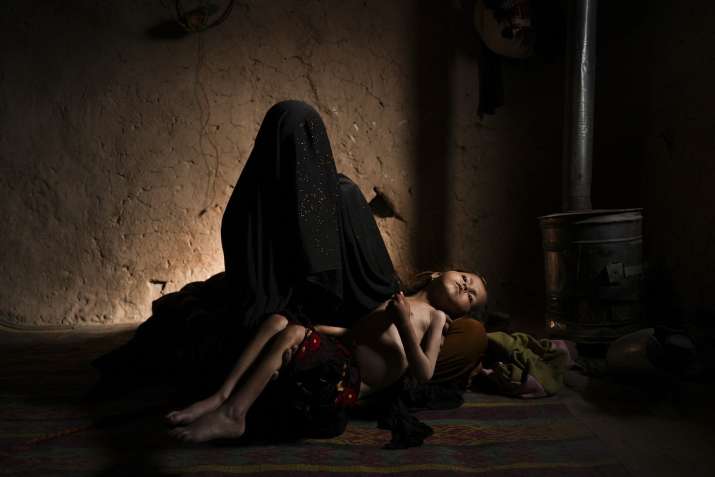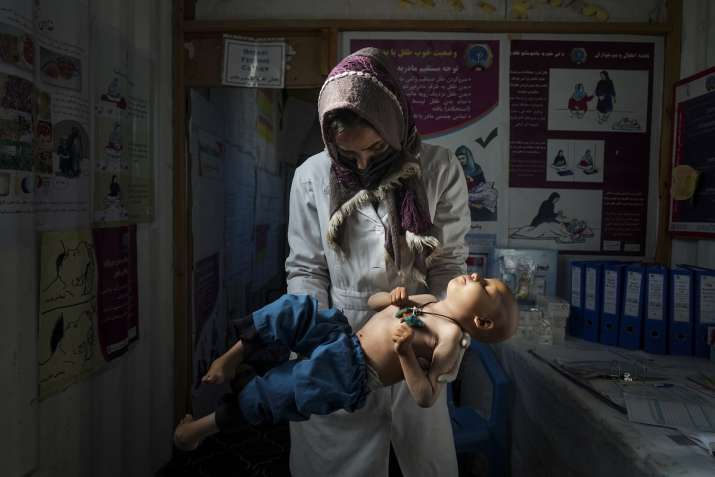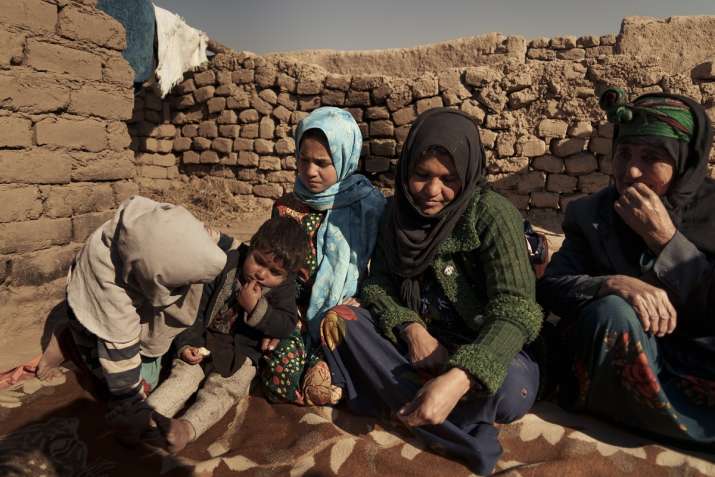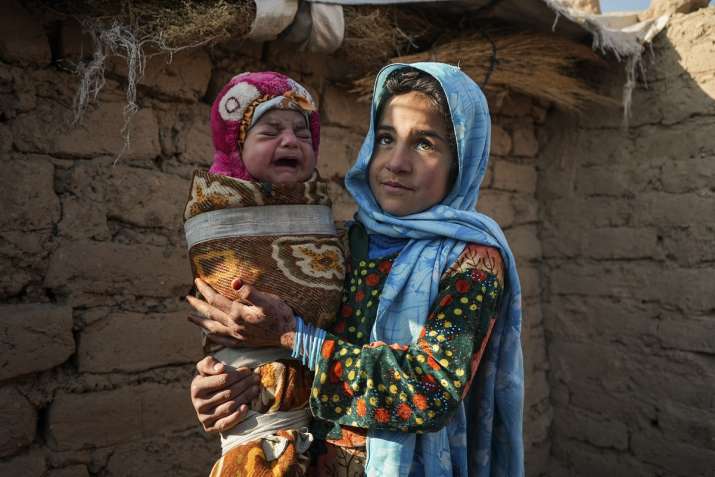
Fatima keeps her 4-year-old daughter Nazia, suffering from acute malnutrition, at her home near Herat in western Afghanistan.
In a vast settlement of mud-brick huts housing people displaced by drought and war in western Afghanistan, a woman struggles to save her daughter.
Aziz Gul’s husband sold the 10-year-old girl for marriage without informing his wife, taking a down payment so that she could support their family of five children. Without that money, he told her, they would all starve. He had to sacrifice one to save the rest.
Among the growing number of destitute people in Afghanistan, many are making desperate decisions as if their country has been plunged into a vortex of poverty.
When the Taliban seized power in mid-August amid a chaotic withdrawal of US and NATO troops, the aid-dependent country’s economy was already in shambles. The international community froze Afghanistan’s assets abroad and halted all funding, reluctant to work with the Taliban government, given its reputation for brutality during its previous regime 20 years ago.
The consequences have been disastrous for a country reeling from four decades of war, a terrible drought and the coronavirus pandemic. Many state employees, including doctors, have not been paid for months. Malnutrition and poverty haunt the most vulnerable, and aid groups say more than half the population faces severe food shortages.
A nurse checks a baby’s weight at a makeshift clinic hosted by World Vision in a settlement near Herat, Afghanistan
“The situation in this country is worsening day by day, and children in particular are suffering,” said Asunth Charles, national director of the World Vision Assistance Organization in Afghanistan, a health facility for displaced people outside the western city of Herat. runs the clinic. ,
“Today I am deeply saddened to see that families are willing to sell their children to feed other family members,” Charles said. “So this is the right time to stand up for the humanitarian community and be with the people of Afghanistan.”
Arranging marriages for very young girls is a common practice throughout the region. The groom’s family – often distant relatives – pays money to seal the deal, and the child usually stays with his parents until he is at least 15 or 16 years old. Yet many do not even have a basic meal, some say they will allow prospective grooms to take very young girls or are even trying to sell their sons.
But in this deeply patriarchal, male-dominated society, Gul is unusually opposed. Married herself at the age of 15, she says that she would kill herself if her daughter Kandi Gul was forcibly taken away.
Aziz Gul, second from right, and his 10-year-old daughter Kandi, Central, sit outside their home with other family members near Herat, Afghanistan.
Gul remembers very well the moment when she came to know that her husband had sold Kandi. The family had been eating food for about two months. Eventually, she asked her husband where the money came from, and he told her.
“My heart stopped beating. I wish I had died then, but maybe God didn’t want me to die,” said Gul. Kandi sat beside her mother, her brown eyes gleaming from under her sky-blue scarf. was peeping in shame.” Every time I remember that night… I die and come back to life. it was very difficult.”
She asked her husband why he did this.
Read also | 2021: the year of the fall of Afghanistan at the hands of the Taliban. Full timeline of how things unfolded
“He said he wanted to sell one and save the other. ‘You would all die like this,’ (he said.) I told him, ‘It was much better to die than what you did.'”
Gul rallies to her community, telling her brother and village elders that her husband has sold their child behind their back. He supported her, and with their help she secured a “divorce” for her child, but only on condition that she pay back the 100,000 Afghanis (about $1,000) received by her husband.
That’s money he doesn’t have. Her husband fled, probably fearing that Gul might censure the authorities. The Taliban government recently announced a ban on using women and girls as exchange tokens to force women into marriage or settle disputes.
The family of the potential groom, who is around 21 or 22 years old, has tried several times to claim the girl, she says. She is not sure how long she can defend them.
Kandi Gul holds her brother, who has been displaced by war and drought, near Herat, Afghanistan, outside their home.
“I’m just so desperate. If I can’t afford to pay these people and keep my daughter by my side, I’ve said I’ll kill myself,” Gul said. “But then I I think about the other kids. What will happen to them? Who will feed them?” Her eldest is 12 years old, her youngest – her sixth – just two months.
Now Gul alone leaves the children with her old mother while she goes to work in people’s homes. His 12-year-old son works as a saffron picker after school. This is barely enough to keep them fed, and the saffron season is short, only a few weeks in the fall.
“We don’t have anything,” said Gul.
In another part of the same camp, Hamid Abdullah, a father of four, was also selling his young daughters in arranged marriages, desperate for money to treat his ailing wife, pregnant with their fifth child.
He said Abdullah had borrowed money for his wife’s treatment and could not return it. So three years ago, she received a downpayment for her eldest daughter, Hoshran, now 7 years old, to arrange an arranged marriage with an 18-year-old boy in her native Badghis province. He is now looking for someone to buy his second 6 year old daughter Nazia.
“We don’t have food to eat,” Abdullah explained, adding that he also had to buy medicine for his wife, who would need further treatment soon. “He needs another surgery, I don’t have a single afghan to pay for the doctor.”
He said the family that bought Hoshran is waiting for him to grow up before disposing of the full amount.
But now he needs money for food and treatment, so he is trying to get Nazia married for around 20,000–30,000 afghani ($200–$300).
“What? We have to do it, we have no other option,” said his wife, Bibi Jaan. “When we decided, it was as if someone had snatched a body part from me.”
Another displaced family in the neighboring Badghis province is considering selling their 8-year-old son Salahuddin.
His mother, Guldasta, said that after a few days with nothing to eat, she asked her husband to take the boy to the market and sell him to bring food for others.
“I don’t want to sell my son, but I have to,” said the 35-year-old. “No mother can do that to her child, but when you have no other choice, you have to make a decision against your will.”
Salahuddin blinked and stared silently. Surrounded by some of his seven brothers and sisters, his lips trembled slightly.
Their father Shakir, who is blind in one eye and has kidney problem, said that the children were crying of hunger for several days. Twice, he said, he decided to take the boy to the market and twice stumbled, unable to go along with it. “But now I feel like I have no choice but to sell him.”
Buying boys is thought to be less common than girls, and when it does, it appears to be cases of baby boys bought by families who have no sons. In despair, Guldasta thought that perhaps such a family would like an 8-year-old girl.
The desperation of millions is evident as more and more people are struggling with hunger. According to the United Nations, by the end of the year, about 3.2 million children under the age of 5 are expected to suffer from acute malnutrition.
Nazia is one of them. The 4-year-old was lying unconscious in her mother’s lap after visiting the World Vision Health Clinic.
Two years ago, Nazia was a fat child, said her mother, Fatima. Now, his amputated limbs are just bone covering the skin. His little heart beats under his ribs.
“Prices are high. Flour is expensive, cooking oil is expensive, everything is expensive,” said Fatima. “All day she has been asking me to give her meat, curd and fruits. We have nothing , and we don’t have money to buy it for him.”
World Vision’s national director for Afghanistan, Charles, said the humanitarian aid fund was desperately needed.
“I am happy to see that the pledges have been made,” she said. But promises “should not remain as promises, they should be seen as reality on the ground.”
,


